【2013中考夺分】新目标英语七年级上册
文档属性
| 名称 | 【2013中考夺分】新目标英语七年级上册 | 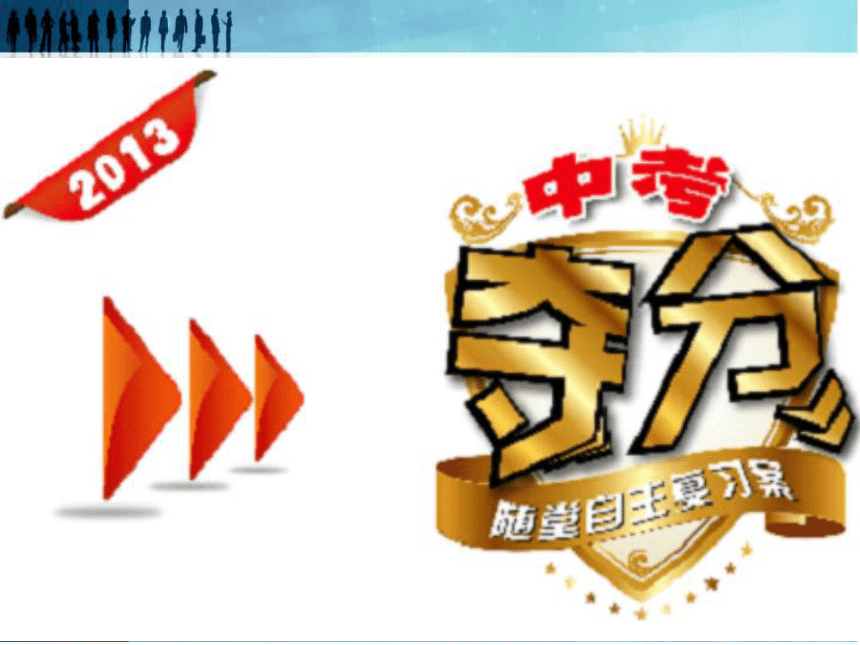 | |
| 格式 | zip | ||
| 文件大小 | 660.1KB | ||
| 资源类型 | 教案 | ||
| 版本资源 | 通用版 | ||
| 科目 | 英语 | ||
| 更新时间 | 2013-03-17 14:56:43 | ||
图片预览

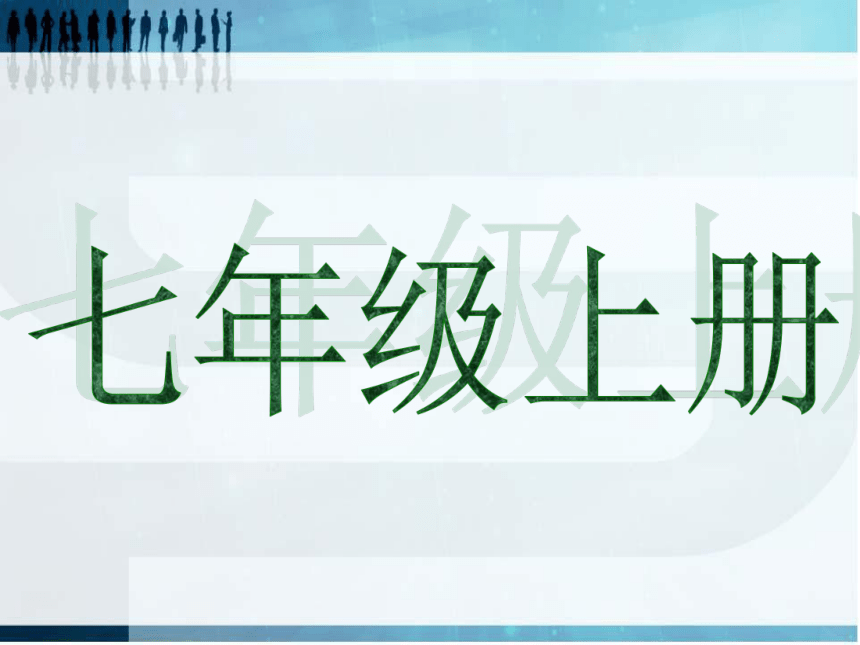
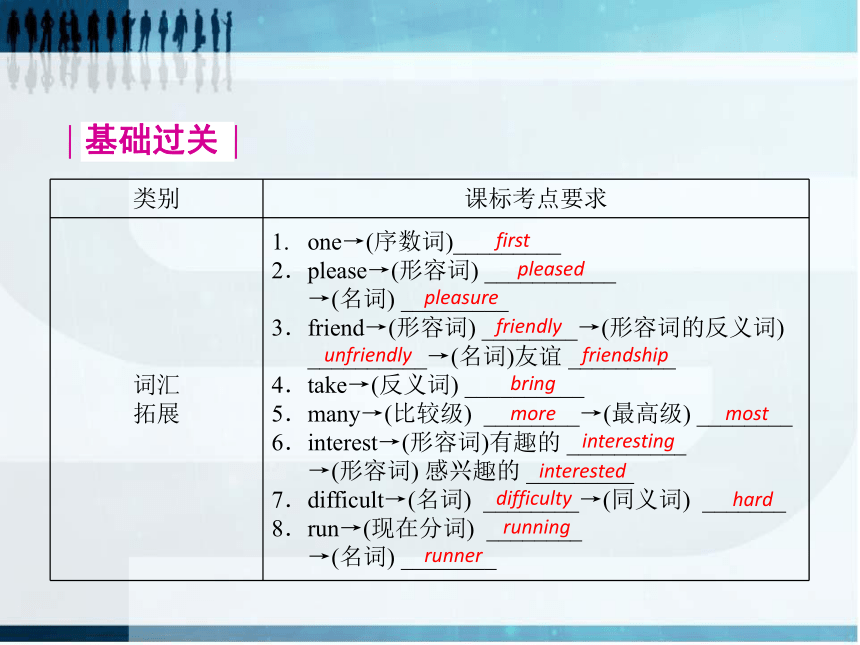
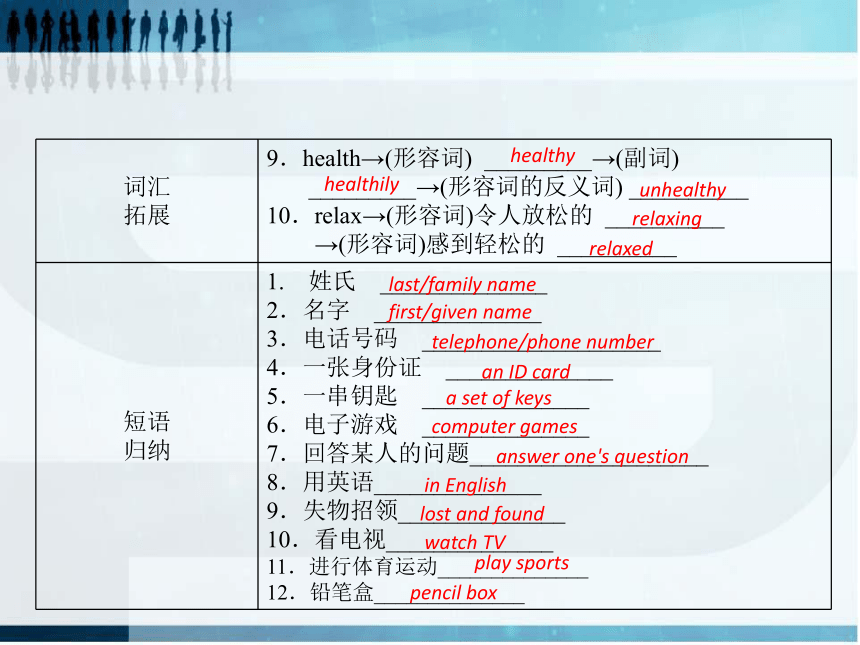
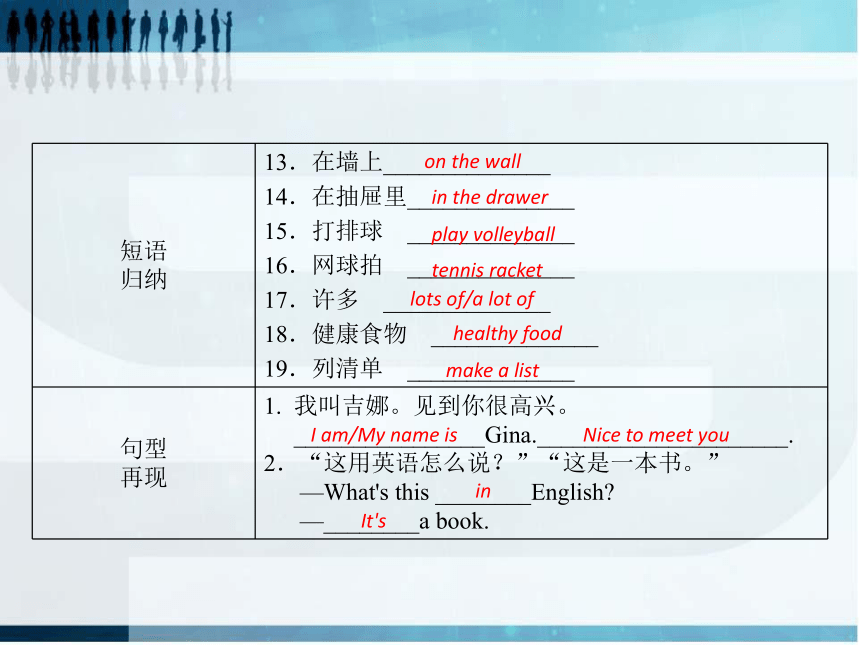
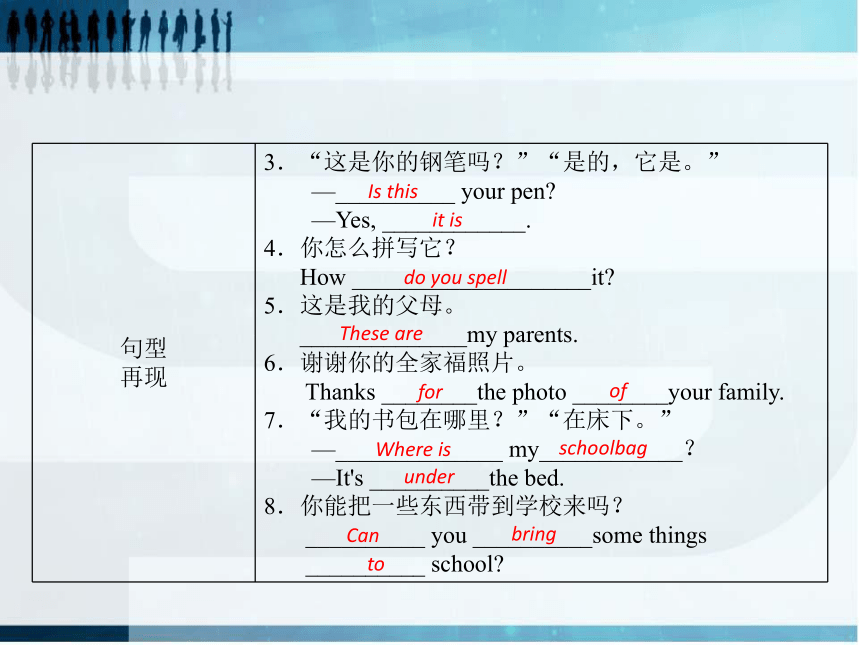
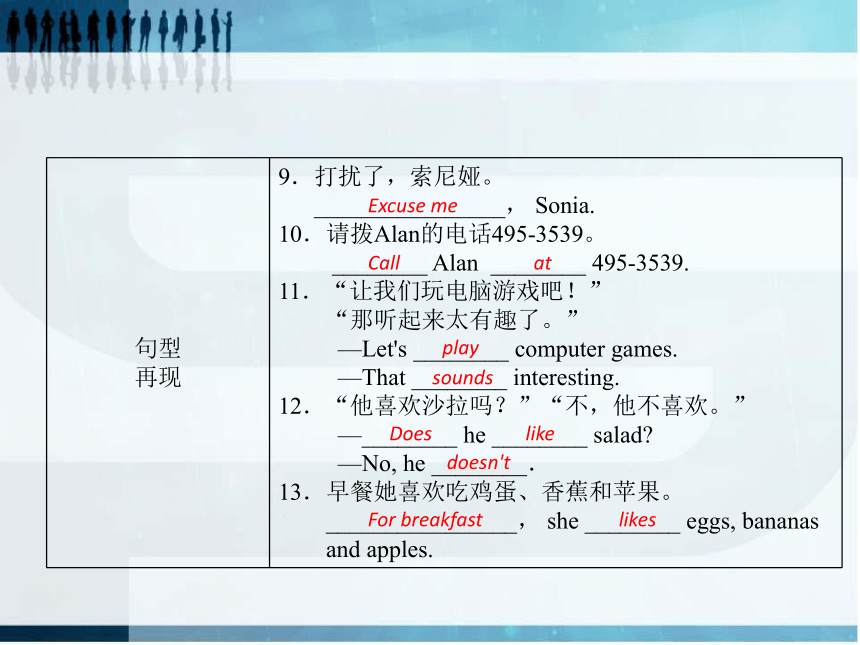
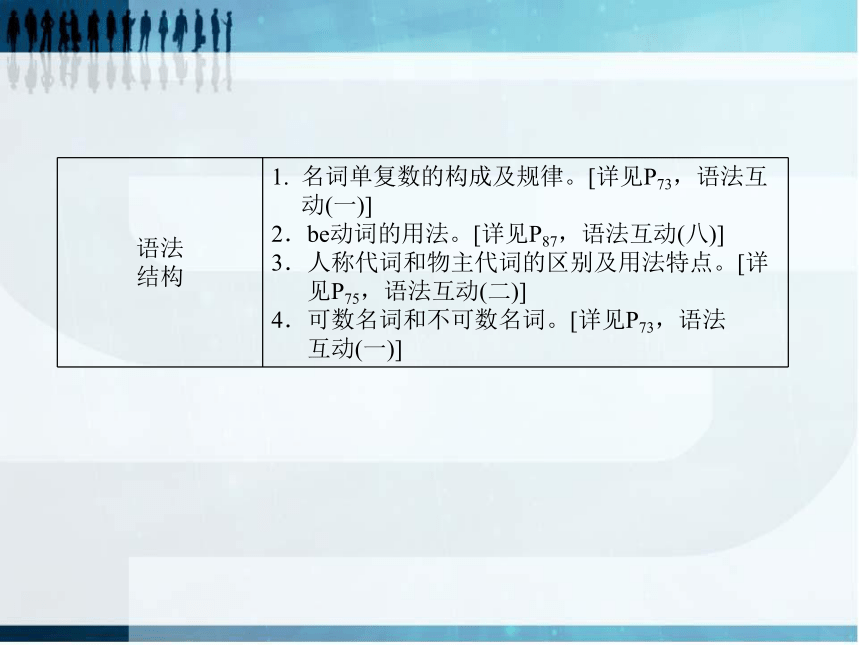
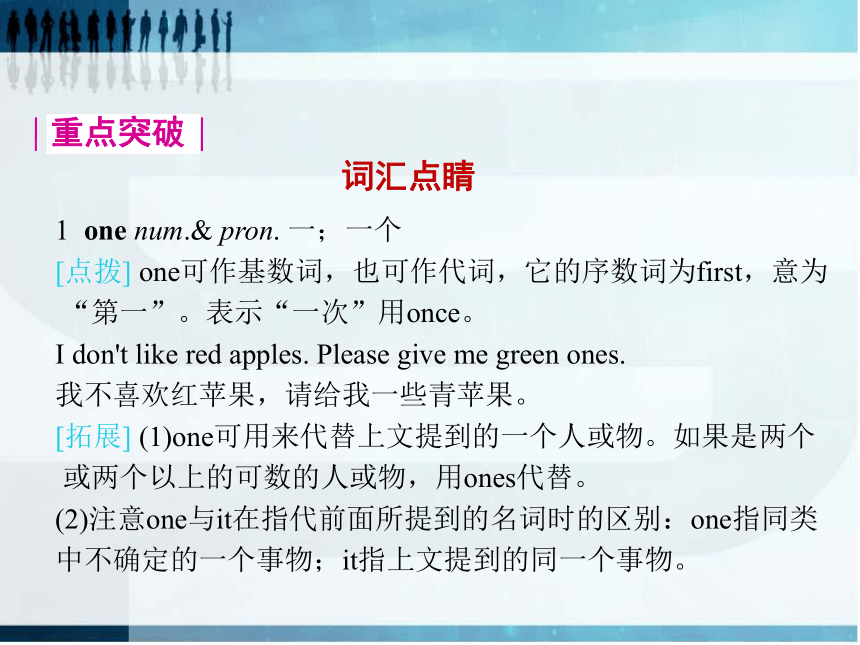
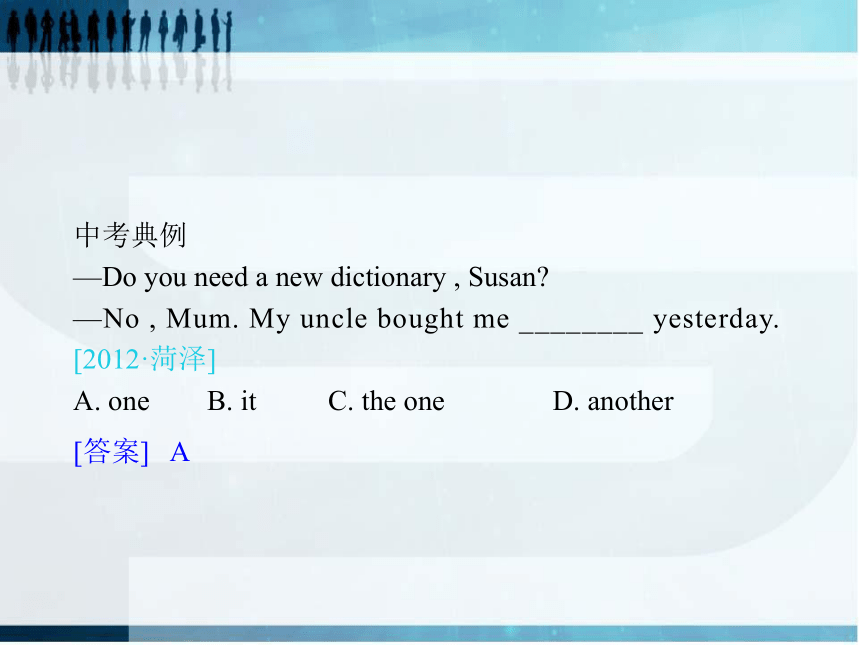
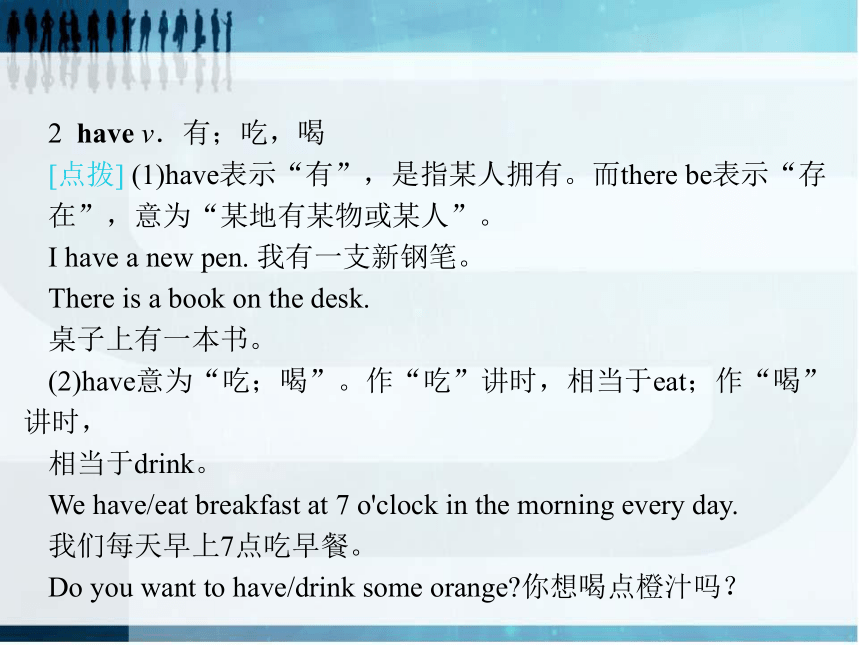
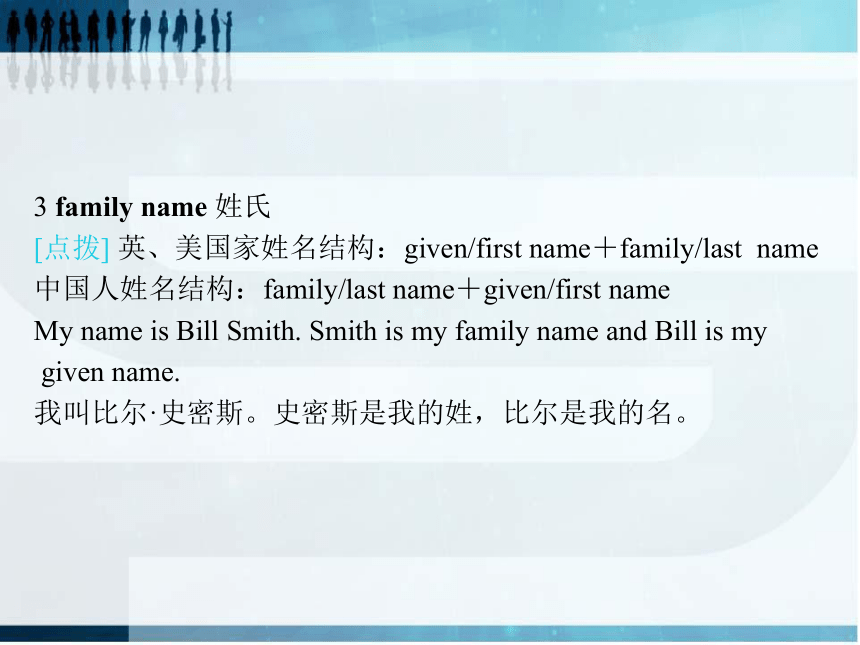
文档简介
课件49张PPT。七年级上册firstpleasedpleasurefriendlyrunninghardunfriendlyfriendshipbringmoremostinterestinginteresteddifficultyrunnerhealthyhealthilyunhealthyrelaxingrelaxedlast/family name first/given nametelephone/phone number an ID carda set of keys computer gamesanswer one's questionin Englishlost and found watch TV play sports pencil boxon the wallin the drawer play volleyballtennis racket lots of/a lot ofhealthy food make a list I am/My name isNice to meet you inIt'sIs thisit is do you spell These arefor of Where is schoolbagunderCanbringtoExcuse me Call at playsounds Doeslikedoesn'tFor breakfastlikes1 one num.& pron. 一;一个
[点拨] one可作基数词,也可作代词,它的序数词为first,意为
“第一”。表示“一次”用once。
I don't like red apples. Please give me green ones.
我不喜欢红苹果,请给我一些青苹果。
[拓展] (1)one可用来代替上文提到的一个人或物。如果是两个
或两个以上的可数的人或物,用ones代替。
(2)注意one与it在指代前面所提到的名词时的区别:one指同类
中不确定的一个事物;it指上文提到的同一个事物。 词汇点睛中考典例
—Do you need a new dictionary , Susan?
—No , Mum. My uncle bought me ________ yesterday. [2012·菏泽]
A. one B. it C. the one D. another[答案] A2 have v.有;吃,喝
[点拨] (1)have表示“有”,是指某人拥有。而there be表示“存
在”,意为“某地有某物或某人”。
I have a new pen. 我有一支新钢笔。
There is a book on the desk.
桌子上有一本书。
(2)have意为“吃;喝”。作“吃”讲时,相当于eat;作“喝”讲时,
相当于drink。
We have/eat breakfast at 7 o'clock in the morning every day.
我们每天早上7点吃早餐。
Do you want to have/drink some orange?你想喝点橙汁吗?第1课时┃ 重点突破巧辨异同1 look/see/watch/read
(1)look强调看的动作,后接宾语时加介词at;作系动词时表示“看起来”,后常接形容词作表语。
Well, now let's look at this picture.
好,现在让我们来看一看这幅图片。
Her mother looks young. 她母亲看上去很年轻。(2)see后接宾语,意为“看见,看到”,强调看的结果。“看医生
(see the/a doctor)”、“看电影(see a film=watch a movie)”常用这
个词。
You'd better go to see a doctor. 你最好去看看医生。
(3)watch意为“观看,注视”,“看电视(watch TV)”、“看比赛(以
及各种表演等)”习惯上用这个词。watch 作名词时意为“手
表”,复数形式是watches。
Would you like to watch a football match with me?
你愿意同我一起看一场足球赛吗?
(4)read强调“读”,常用于表示“看书/看报刊杂志/……”。
My father usually reads newspapers after supper.
我爸爸常在晚饭后读报。第1课时┃ 重点突破2 take/bring/carry/get/fetch
(1)take意为“拿去;带去”,指把某物/人从说话处带到别处,它
与bring所表示的方向相反。
Take away the empty bottle, and bring me a full one.
把这个空瓶子拿走,给我拿个满的来。
(2)bring意为“拿来;带来”,指从别处带到说话处。
You'd better bring your homework here tomorrow.
你最好明天把你的作业带到这里来。
(3)get意为“取来”,表示到某地去把某物取来,相当于fetch。
Who can get some water for me?
谁能去给我弄些水来?
第1课时┃ 重点突破(4)carry意为“搬运;携带”,没有方向性。
He is carrying a big box on his back. 他背着个大箱子。
(5)fetch 意为“去拿来”,既包括“去”的意思,又包括“来”的
意思。
I asked her to fetch an evening paper.
我求她去给我拿一张晚报来。
第1课时┃ 重点突破
中考典例
—William , please remember to______ the photo taken in
Canada here when you come to school tomorrow. I’d like to
have a look.
—OK. I’ll introduce something about it to you myself. [2010·襄樊]
A. take B. pass C. bring D. carry第1课时┃ 重点突破[解析] C 由here可知是带到说话处,故选C。He cannot speak English well. 他英语说得不流利。
I'm quite well. 我很健康。
It is a fine day today. 今天是个好天气。 第1课时┃ 重点突破3 good/fine/nice/well 句型透视1 Call Alan at 495-3539.
请拨Alan的电话495-3539。
[点拨] (1)“call sb at+电话号码”表示“拨……号码找某人”。
(2)这是一个祈使句。祈使句变否定句时在前面加Don't。
Please call the police at 110 if you are in trouble.
如果遇到了麻烦,你可以拨打110找警察。
Don't call him in the morning.
不要在早晨给他打电话。
[拓展] call 还有“拜访”的意思,常用搭配:
call on sb; call at sp第1课时┃ 重点突破2 Thanks for the photo of your family. 谢谢你的全家福。
[句型] thanks for…=thank you for…, 表示“因……表示感
谢”,介词for后接名词或动词-ing形式。
Thanks for helping me.=Thank you for your help.
谢谢你的帮助。
[拓展] thanks to意为“由于,多亏”,其中to为介词,并非不定式
符号。
Thanks to the English language,we can learn a lot from other
countries.
由于英语这门语言,我们能从其他国家学到很多东西。第1课时┃ 重点突破第1课时┃ 重点突破3 Let's play soccer.我们踢足球吧。
[点拨] “Let‘s…”意思是“咱们……吧。”let后面的宾语如果是代
词,应用宾格,后面接不带to的不定式(即动词原形)。
肯定回答:OK./Sure./Certainly./Good idea./All right.等。
否定回答:Sorry, I…或No, let's…
—Let's go for a walk after supper.
咱们晚饭后去散散步吧。
—Good idea. 好主意。
[拓展] let sb do sth表示“让某人做某事”。
Let him come in.让他进来。第1课时┃ 重点突破中考典例
China plans to let tourists ______ the Xisha Islands in
the South China Sea this year. [2012·临沂]
A. visit B. visits C. visiting D. visited
[解析] A 根据let sb do sth结构可知选A。 B D A第1课时┃ 重点突破4.—Thanks for your help.
—________.
A.No, thanks B.Let me see
C.You are welcome D.That's OK
5. —What about this black coat, sir?
—It ________ nice. I'll take it.
A. looks B. sounds
C. smells D. tastes第1课时┃ 重点突破 C A
Ⅱ. 选词填空
A) 根据句意,用see, look, watch或read 的适当形式填空。
1.Did you ________ the football game on TV last night?
2.Don't ________ in the sun. It's bad for your eyes.
3.I am ____________ the blackboard, but I can't ________ the
words clearly.
B) 根据句意,用bring, take, carry, get或fetch的适当形式填空。
4.________ your homework here tomorrow morning, please.
5.The boxes are too heavy. Let's ________ them for you.
6.I have no water. Would you go and __________ some for me?
7.The baby is ill. You must ________ her to the hospital.watchread looking atsee Bring carry get/fetch take第1课时┃ 重点突破第2课时┃ Units 7—12,Book 7A第2课时 Units 7—12,Book 7Asale buy action actor actress funny exciting excited really successful successfully succeed 第2课时┃ 基础过关musician musical have a look go to the movies/a movie stay at home learn about how old go to bed help sb with sth get up go to school get to/arrive at/in teacher business free ninth nineteen ninety 第2课时┃ 基础过关on sale speech contest speak English after class/school at a price of on weekends play the guitar have breakfast/lunch/supper take/have a bath (shower) do one's homework How much 第2课时┃ 基础过关 seven dollars afford prices When is birthday My birthday November 10th How old fifteen What kind of movies action movies and How much 第2课时┃ 基础过关to go to a movie Can dance I can club join time usually get up is your favorite subject do you like P.E 第2课时┃ 基础过关词汇点睛1 buy v. 购买;买
[点拨] (1)buy sb sth=buy sth for sb意为“买某物给某人”。buy
的反义词是sell,sell sb sth =sell sth to sb(把某物卖给某人)。
My father bought me a computer.
=My father bought a computer for me.
我父亲给我买了一台电脑。
(2)buy sth from sb意为“向某人买某物”。
He bought this watch from a friend.
他从一位朋友那儿买了这块表。
第2课时┃ 重点突破第2课时┃ 重点突破(3)buy是短暂性动词,在句中不能与时间段连用。将它改
为 have才可与时间段连用。
I have had the pen for two years.这支钢笔我买了两年了。
(4)sale为动词sell的名词形式。
on sale 出售,廉价出售 for sale 出售的,待售的,上市的
中考典例
—When did you buy the computer?
—I have ______ this computer for 5 years,but it still works
well.[2012·恩施]
A. bought B. have C. had
[解析] C buy是短暂性动词,若要和时间段连用,则要改
为have。本句的“four five years”为时间段,故选C。第2课时┃ 重点突破 2 afford v. 负担得起;买得起
[点拨] 常和情态动词 can或be able to连用,常用于afford
sth或afford to do sth结构。
He can't afford (to buy) a car.他买不起一辆车。
I can‘t afford to go to a restaurant every day.
每天都去餐馆吃饭,我真是支付不起。 中考典例
—Why don’t you buy the computer?
—It’s too expensive, I can’t_____it.[2012·襄阳]
A. afford B. sell C. borrow D. keep
[解析] A 根据“It’s too expensive.”可知答话者“买不起这台
电脑”。第2课时┃ 重点突破 3 busy adj.繁忙的;忙碌的
[点拨] busy为形容词,它的反义词是free(空闲的)。
常考搭配
be busy with sth 忙于某事 be busy doing sth 忙于做某事
Are you busy with your homework?你正忙于做作业吗?
Mr Smith is busy writing a letter.史密斯先生正忙着写信。
4 strict adj.严格的;严厉的
[搭配] be strict with sb 对某人要求严格
be strict in sth 对 某事要求严格
She is strict with her children and in her work.
她对子女严格要求,并且工作也很严谨。第2课时┃ 重点突破巧辨异同(2)speak 作不及物动词时,强调说话的动作;作及物动词时,
后面加语言。
The baby can‘t speak.这个婴儿不会说话。
speak English说英语
(3)talk强调两人之间的谈话。常见搭配:
talk with/to sb 和某人交谈;talk about sth 谈论某事。
(4)tell意为“告诉;讲述”,后面常接双宾语。
第2课时┃ 重点突破常考搭配
tell sb a story 给某人讲故事
tell sb sth 告诉某人某事
tell a lie 撒谎 tell the truth 说实话
tell sb(not)to do sth 告诉某人(不要)做某事
Did you tell her the news? 你把这个消息告诉她了吗?
She is talking with Lucy in English.
她正在和露茜用英语交谈。
What did he say about the new teacher?
关于这位新老师,他都说了些什么?
I am sure that he is telling a lie.
我确信,他在撒谎。第2课时┃ 重点突破中考典例
“Don’t______ to strangers on your way to and from school ”,
mother often ________to me.[2011·兰州]
A. speak; says B. speak; tells
C. talk; speaks D. talk; tells
第2课时┃ 重点突破[解析] A 前一空用speak/talk to表示“与……交谈”。后一空
用say强调前面说话的内容。tell常用与tell sb to do sth或tell sb sth结构。正确答案是A。1 How much is this T-shirt? 这件T恤衫多少钱?
[点拨] how much 意为“多少”,在不同的语境中,有不同的含义。
(1)询问价格
“How much+ be+主语?”意为“……多少钱?”,其中be的单复
数形式由后面的主语来决定。询问价格还可以用What's the
price of …?和How much does …cost?这两个句型。
How much are these shoes?
=What's the price of the shoes?
=How much do the shoes cost? 这些鞋多少钱?第2课时┃ 重点突破句型透视(2)询问不可数名词的数量
How much bread do you want? 你想要多少面包?
(3)询问程度
How much do you love your school?你有多热爱你的学校?
[拓展] how many也是“多少”的意思,用来询问可数名词的数量。
How many apples do you want? 你想要多少苹果?
中考典例
—______did you pay for the CD?
—Only nine dollars.[2012.河北]
A. How many B. How much C. How long D. How often
第2课时┃ 重点突破[解析] B 由答语中的“nine dollars”可知是问价钱,故选B。
2 I want to see a comedy.我想看喜剧。
[搭配] want sth=would like sth 想要/需要某物
want to do sth =would like to do sth 想做某事
want sb to do sth =would like sb to do sth想要某人做某事
I want a dictionary. 我想要一本字典。
They want to play tennis. 他们想要打网球。
My parents want me to study hard at school.
我父母想要我在学校努力学习。
第2课时┃ 重点突破
3 She thinks she can learn about Chinese history.
她觉得她可以学中国历史。
[点拨] learn为动词,名词形式为learner。learn about意为
学习关于……(的知识)”。
My sister often goes to the school library to learn
about science.
我姐姐经常去学校图书馆学习关于科学方面的知识。
[拓展]learn…from…向/从……学习……
learn to do sth 学做某事
learn by oneself=teach oneself 自学
第2课时┃ 重点突破第2课时┃ 重点突破4 Can you help kids with swimming?
你能帮助孩子们游泳吗?
[点拨] help sb with sth 意为“在某方面帮助某人”。
He often helps me with my English.他常帮我学英语。
[搭配] help sb (to) do sth 帮助某人做某事
help oneself to sth 随便吃(喝)……
with the help of=with one‘s help 在……的帮助下 ask sb for help 向某人求助 第2课时┃ 重点突破
中考典例
Bill has made great progress ______ his teachers.
[2012.福州]
A. for B. with C. under
[解析] B 根据短语“with the help of”可知答案为B。Ⅰ. 单项填空
1.—The house price has been rising in the past two years.
—Yes, I cannot ________ to buy a small apartment even with
my parents' help.
A.want B.afford
C.solve D.deal
2.—What did your sister say to you last night?
—She wanted me ________ my father her secret.
A.to tell you B.not to tell
C.don't tell D.not tell 第2课时┃ 重点突破 即时自测B B 3.My brother once studied in America for three years, so he can
________ English very well.
A.talk B.speak
C.say D.tell
4.—Jack, could you help me ________ when the plane will take
off on the Internet?
—I'm sorry, my computer doesn't work.
A.get out B.look out
C. take out D. find out第2课时┃ 重点突破B D Ⅱ. 从方框中选择恰当的单词或词组,并用其正确形式填空
play with, do one‘s homework, way,success, how much
1. —___________ meat do you want?
—Two kilos.
2. I like to ___________ my dog.
3. Work hard and you'll be ____________.
4. She often helps her brother _______________________
after school.
5. Can you find a ________ to work out the math problem? 第2课时┃ 重点突破How much play with successful (to) do his homework way 谢谢合作 再见课件49张PPT。七年级上册firstpleasedpleasurefriendlyrunninghardunfriendlyfriendshipbringmoremostinterestinginteresteddifficultyrunnerhealthyhealthilyunhealthyrelaxingrelaxedlast/family name first/given nametelephone/phone number an ID carda set of keys computer gamesanswer one's questionin Englishlost and found watch TV play sports pencil boxon the wallin the drawer play volleyballtennis racket lots of/a lot ofhealthy food make a list I am/My name isNice to meet you inIt'sIs thisit is do you spell These arefor of Where is schoolbagunderCanbringtoExcuse me Call at playsounds Doeslikedoesn'tFor breakfastlikes1 one num.& pron. 一;一个
[点拨] one可作基数词,也可作代词,它的序数词为first,意为
“第一”。表示“一次”用once。
I don't like red apples. Please give me green ones.
我不喜欢红苹果,请给我一些青苹果。
[拓展] (1)one可用来代替上文提到的一个人或物。如果是两个
或两个以上的可数的人或物,用ones代替。
(2)注意one与it在指代前面所提到的名词时的区别:one指同类
中不确定的一个事物;it指上文提到的同一个事物。 词汇点睛中考典例
—Do you need a new dictionary , Susan?
—No , Mum. My uncle bought me ________ yesterday. [2012·菏泽]
A. one B. it C. the one D. another[答案] A2 have v.有;吃,喝
[点拨] (1)have表示“有”,是指某人拥有。而there be表示“存
在”,意为“某地有某物或某人”。
I have a new pen. 我有一支新钢笔。
There is a book on the desk.
桌子上有一本书。
(2)have意为“吃;喝”。作“吃”讲时,相当于eat;作“喝”讲时,
相当于drink。
We have/eat breakfast at 7 o'clock in the morning every day.
我们每天早上7点吃早餐。
Do you want to have/drink some orange?你想喝点橙汁吗?第1课时┃ 重点突破巧辨异同1 look/see/watch/read
(1)look强调看的动作,后接宾语时加介词at;作系动词时表示“看起来”,后常接形容词作表语。
Well, now let's look at this picture.
好,现在让我们来看一看这幅图片。
Her mother looks young. 她母亲看上去很年轻。(2)see后接宾语,意为“看见,看到”,强调看的结果。“看医生
(see the/a doctor)”、“看电影(see a film=watch a movie)”常用这
个词。
You'd better go to see a doctor. 你最好去看看医生。
(3)watch意为“观看,注视”,“看电视(watch TV)”、“看比赛(以
及各种表演等)”习惯上用这个词。watch 作名词时意为“手
表”,复数形式是watches。
Would you like to watch a football match with me?
你愿意同我一起看一场足球赛吗?
(4)read强调“读”,常用于表示“看书/看报刊杂志/……”。
My father usually reads newspapers after supper.
我爸爸常在晚饭后读报。第1课时┃ 重点突破2 take/bring/carry/get/fetch
(1)take意为“拿去;带去”,指把某物/人从说话处带到别处,它
与bring所表示的方向相反。
Take away the empty bottle, and bring me a full one.
把这个空瓶子拿走,给我拿个满的来。
(2)bring意为“拿来;带来”,指从别处带到说话处。
You'd better bring your homework here tomorrow.
你最好明天把你的作业带到这里来。
(3)get意为“取来”,表示到某地去把某物取来,相当于fetch。
Who can get some water for me?
谁能去给我弄些水来?
第1课时┃ 重点突破(4)carry意为“搬运;携带”,没有方向性。
He is carrying a big box on his back. 他背着个大箱子。
(5)fetch 意为“去拿来”,既包括“去”的意思,又包括“来”的
意思。
I asked her to fetch an evening paper.
我求她去给我拿一张晚报来。
第1课时┃ 重点突破
中考典例
—William , please remember to______ the photo taken in
Canada here when you come to school tomorrow. I’d like to
have a look.
—OK. I’ll introduce something about it to you myself. [2010·襄樊]
A. take B. pass C. bring D. carry第1课时┃ 重点突破[解析] C 由here可知是带到说话处,故选C。He cannot speak English well. 他英语说得不流利。
I'm quite well. 我很健康。
It is a fine day today. 今天是个好天气。 第1课时┃ 重点突破3 good/fine/nice/well 句型透视1 Call Alan at 495-3539.
请拨Alan的电话495-3539。
[点拨] (1)“call sb at+电话号码”表示“拨……号码找某人”。
(2)这是一个祈使句。祈使句变否定句时在前面加Don't。
Please call the police at 110 if you are in trouble.
如果遇到了麻烦,你可以拨打110找警察。
Don't call him in the morning.
不要在早晨给他打电话。
[拓展] call 还有“拜访”的意思,常用搭配:
call on sb; call at sp第1课时┃ 重点突破2 Thanks for the photo of your family. 谢谢你的全家福。
[句型] thanks for…=thank you for…, 表示“因……表示感
谢”,介词for后接名词或动词-ing形式。
Thanks for helping me.=Thank you for your help.
谢谢你的帮助。
[拓展] thanks to意为“由于,多亏”,其中to为介词,并非不定式
符号。
Thanks to the English language,we can learn a lot from other
countries.
由于英语这门语言,我们能从其他国家学到很多东西。第1课时┃ 重点突破第1课时┃ 重点突破3 Let's play soccer.我们踢足球吧。
[点拨] “Let‘s…”意思是“咱们……吧。”let后面的宾语如果是代
词,应用宾格,后面接不带to的不定式(即动词原形)。
肯定回答:OK./Sure./Certainly./Good idea./All right.等。
否定回答:Sorry, I…或No, let's…
—Let's go for a walk after supper.
咱们晚饭后去散散步吧。
—Good idea. 好主意。
[拓展] let sb do sth表示“让某人做某事”。
Let him come in.让他进来。第1课时┃ 重点突破中考典例
China plans to let tourists ______ the Xisha Islands in
the South China Sea this year. [2012·临沂]
A. visit B. visits C. visiting D. visited
[解析] A 根据let sb do sth结构可知选A。 B D A第1课时┃ 重点突破4.—Thanks for your help.
—________.
A.No, thanks B.Let me see
C.You are welcome D.That's OK
5. —What about this black coat, sir?
—It ________ nice. I'll take it.
A. looks B. sounds
C. smells D. tastes第1课时┃ 重点突破 C A
Ⅱ. 选词填空
A) 根据句意,用see, look, watch或read 的适当形式填空。
1.Did you ________ the football game on TV last night?
2.Don't ________ in the sun. It's bad for your eyes.
3.I am ____________ the blackboard, but I can't ________ the
words clearly.
B) 根据句意,用bring, take, carry, get或fetch的适当形式填空。
4.________ your homework here tomorrow morning, please.
5.The boxes are too heavy. Let's ________ them for you.
6.I have no water. Would you go and __________ some for me?
7.The baby is ill. You must ________ her to the hospital.watchread looking atsee Bring carry get/fetch take第1课时┃ 重点突破第2课时┃ Units 7—12,Book 7A第2课时 Units 7—12,Book 7Asale buy action actor actress funny exciting excited really successful successfully succeed 第2课时┃ 基础过关musician musical have a look go to the movies/a movie stay at home learn about how old go to bed help sb with sth get up go to school get to/arrive at/in teacher business free ninth nineteen ninety 第2课时┃ 基础过关on sale speech contest speak English after class/school at a price of on weekends play the guitar have breakfast/lunch/supper take/have a bath (shower) do one's homework How much 第2课时┃ 基础过关 seven dollars afford prices When is birthday My birthday November 10th How old fifteen What kind of movies action movies and How much 第2课时┃ 基础过关to go to a movie Can dance I can club join time usually get up is your favorite subject do you like P.E 第2课时┃ 基础过关词汇点睛1 buy v. 购买;买
[点拨] (1)buy sb sth=buy sth for sb意为“买某物给某人”。buy
的反义词是sell,sell sb sth =sell sth to sb(把某物卖给某人)。
My father bought me a computer.
=My father bought a computer for me.
我父亲给我买了一台电脑。
(2)buy sth from sb意为“向某人买某物”。
He bought this watch from a friend.
他从一位朋友那儿买了这块表。
第2课时┃ 重点突破第2课时┃ 重点突破(3)buy是短暂性动词,在句中不能与时间段连用。将它改
为 have才可与时间段连用。
I have had the pen for two years.这支钢笔我买了两年了。
(4)sale为动词sell的名词形式。
on sale 出售,廉价出售 for sale 出售的,待售的,上市的
中考典例
—When did you buy the computer?
—I have ______ this computer for 5 years,but it still works
well.[2012·恩施]
A. bought B. have C. had
[解析] C buy是短暂性动词,若要和时间段连用,则要改
为have。本句的“four five years”为时间段,故选C。第2课时┃ 重点突破 2 afford v. 负担得起;买得起
[点拨] 常和情态动词 can或be able to连用,常用于afford
sth或afford to do sth结构。
He can't afford (to buy) a car.他买不起一辆车。
I can‘t afford to go to a restaurant every day.
每天都去餐馆吃饭,我真是支付不起。 中考典例
—Why don’t you buy the computer?
—It’s too expensive, I can’t_____it.[2012·襄阳]
A. afford B. sell C. borrow D. keep
[解析] A 根据“It’s too expensive.”可知答话者“买不起这台
电脑”。第2课时┃ 重点突破 3 busy adj.繁忙的;忙碌的
[点拨] busy为形容词,它的反义词是free(空闲的)。
常考搭配
be busy with sth 忙于某事 be busy doing sth 忙于做某事
Are you busy with your homework?你正忙于做作业吗?
Mr Smith is busy writing a letter.史密斯先生正忙着写信。
4 strict adj.严格的;严厉的
[搭配] be strict with sb 对某人要求严格
be strict in sth 对 某事要求严格
She is strict with her children and in her work.
她对子女严格要求,并且工作也很严谨。第2课时┃ 重点突破巧辨异同(2)speak 作不及物动词时,强调说话的动作;作及物动词时,
后面加语言。
The baby can‘t speak.这个婴儿不会说话。
speak English说英语
(3)talk强调两人之间的谈话。常见搭配:
talk with/to sb 和某人交谈;talk about sth 谈论某事。
(4)tell意为“告诉;讲述”,后面常接双宾语。
第2课时┃ 重点突破常考搭配
tell sb a story 给某人讲故事
tell sb sth 告诉某人某事
tell a lie 撒谎 tell the truth 说实话
tell sb(not)to do sth 告诉某人(不要)做某事
Did you tell her the news? 你把这个消息告诉她了吗?
She is talking with Lucy in English.
她正在和露茜用英语交谈。
What did he say about the new teacher?
关于这位新老师,他都说了些什么?
I am sure that he is telling a lie.
我确信,他在撒谎。第2课时┃ 重点突破中考典例
“Don’t______ to strangers on your way to and from school ”,
mother often ________to me.[2011·兰州]
A. speak; says B. speak; tells
C. talk; speaks D. talk; tells
第2课时┃ 重点突破[解析] A 前一空用speak/talk to表示“与……交谈”。后一空
用say强调前面说话的内容。tell常用与tell sb to do sth或tell sb sth结构。正确答案是A。1 How much is this T-shirt? 这件T恤衫多少钱?
[点拨] how much 意为“多少”,在不同的语境中,有不同的含义。
(1)询问价格
“How much+ be+主语?”意为“……多少钱?”,其中be的单复
数形式由后面的主语来决定。询问价格还可以用What's the
price of …?和How much does …cost?这两个句型。
How much are these shoes?
=What's the price of the shoes?
=How much do the shoes cost? 这些鞋多少钱?第2课时┃ 重点突破句型透视(2)询问不可数名词的数量
How much bread do you want? 你想要多少面包?
(3)询问程度
How much do you love your school?你有多热爱你的学校?
[拓展] how many也是“多少”的意思,用来询问可数名词的数量。
How many apples do you want? 你想要多少苹果?
中考典例
—______did you pay for the CD?
—Only nine dollars.[2012.河北]
A. How many B. How much C. How long D. How often
第2课时┃ 重点突破[解析] B 由答语中的“nine dollars”可知是问价钱,故选B。
2 I want to see a comedy.我想看喜剧。
[搭配] want sth=would like sth 想要/需要某物
want to do sth =would like to do sth 想做某事
want sb to do sth =would like sb to do sth想要某人做某事
I want a dictionary. 我想要一本字典。
They want to play tennis. 他们想要打网球。
My parents want me to study hard at school.
我父母想要我在学校努力学习。
第2课时┃ 重点突破
3 She thinks she can learn about Chinese history.
她觉得她可以学中国历史。
[点拨] learn为动词,名词形式为learner。learn about意为
学习关于……(的知识)”。
My sister often goes to the school library to learn
about science.
我姐姐经常去学校图书馆学习关于科学方面的知识。
[拓展]learn…from…向/从……学习……
learn to do sth 学做某事
learn by oneself=teach oneself 自学
第2课时┃ 重点突破第2课时┃ 重点突破4 Can you help kids with swimming?
你能帮助孩子们游泳吗?
[点拨] help sb with sth 意为“在某方面帮助某人”。
He often helps me with my English.他常帮我学英语。
[搭配] help sb (to) do sth 帮助某人做某事
help oneself to sth 随便吃(喝)……
with the help of=with one‘s help 在……的帮助下 ask sb for help 向某人求助 第2课时┃ 重点突破
中考典例
Bill has made great progress ______ his teachers.
[2012.福州]
A. for B. with C. under
[解析] B 根据短语“with the help of”可知答案为B。Ⅰ. 单项填空
1.—The house price has been rising in the past two years.
—Yes, I cannot ________ to buy a small apartment even with
my parents' help.
A.want B.afford
C.solve D.deal
2.—What did your sister say to you last night?
—She wanted me ________ my father her secret.
A.to tell you B.not to tell
C.don't tell D.not tell 第2课时┃ 重点突破 即时自测B B 3.My brother once studied in America for three years, so he can
________ English very well.
A.talk B.speak
C.say D.tell
4.—Jack, could you help me ________ when the plane will take
off on the Internet?
—I'm sorry, my computer doesn't work.
A.get out B.look out
C. take out D. find out第2课时┃ 重点突破B D Ⅱ. 从方框中选择恰当的单词或词组,并用其正确形式填空
play with, do one‘s homework, way,success, how much
1. —___________ meat do you want?
—Two kilos.
2. I like to ___________ my dog.
3. Work hard and you'll be ____________.
4. She often helps her brother _______________________
after school.
5. Can you find a ________ to work out the math problem? 第2课时┃ 重点突破How much play with successful (to) do his homework way 谢谢合作 再见
[点拨] one可作基数词,也可作代词,它的序数词为first,意为
“第一”。表示“一次”用once。
I don't like red apples. Please give me green ones.
我不喜欢红苹果,请给我一些青苹果。
[拓展] (1)one可用来代替上文提到的一个人或物。如果是两个
或两个以上的可数的人或物,用ones代替。
(2)注意one与it在指代前面所提到的名词时的区别:one指同类
中不确定的一个事物;it指上文提到的同一个事物。 词汇点睛中考典例
—Do you need a new dictionary , Susan?
—No , Mum. My uncle bought me ________ yesterday. [2012·菏泽]
A. one B. it C. the one D. another[答案] A2 have v.有;吃,喝
[点拨] (1)have表示“有”,是指某人拥有。而there be表示“存
在”,意为“某地有某物或某人”。
I have a new pen. 我有一支新钢笔。
There is a book on the desk.
桌子上有一本书。
(2)have意为“吃;喝”。作“吃”讲时,相当于eat;作“喝”讲时,
相当于drink。
We have/eat breakfast at 7 o'clock in the morning every day.
我们每天早上7点吃早餐。
Do you want to have/drink some orange?你想喝点橙汁吗?第1课时┃ 重点突破巧辨异同1 look/see/watch/read
(1)look强调看的动作,后接宾语时加介词at;作系动词时表示“看起来”,后常接形容词作表语。
Well, now let's look at this picture.
好,现在让我们来看一看这幅图片。
Her mother looks young. 她母亲看上去很年轻。(2)see后接宾语,意为“看见,看到”,强调看的结果。“看医生
(see the/a doctor)”、“看电影(see a film=watch a movie)”常用这
个词。
You'd better go to see a doctor. 你最好去看看医生。
(3)watch意为“观看,注视”,“看电视(watch TV)”、“看比赛(以
及各种表演等)”习惯上用这个词。watch 作名词时意为“手
表”,复数形式是watches。
Would you like to watch a football match with me?
你愿意同我一起看一场足球赛吗?
(4)read强调“读”,常用于表示“看书/看报刊杂志/……”。
My father usually reads newspapers after supper.
我爸爸常在晚饭后读报。第1课时┃ 重点突破2 take/bring/carry/get/fetch
(1)take意为“拿去;带去”,指把某物/人从说话处带到别处,它
与bring所表示的方向相反。
Take away the empty bottle, and bring me a full one.
把这个空瓶子拿走,给我拿个满的来。
(2)bring意为“拿来;带来”,指从别处带到说话处。
You'd better bring your homework here tomorrow.
你最好明天把你的作业带到这里来。
(3)get意为“取来”,表示到某地去把某物取来,相当于fetch。
Who can get some water for me?
谁能去给我弄些水来?
第1课时┃ 重点突破(4)carry意为“搬运;携带”,没有方向性。
He is carrying a big box on his back. 他背着个大箱子。
(5)fetch 意为“去拿来”,既包括“去”的意思,又包括“来”的
意思。
I asked her to fetch an evening paper.
我求她去给我拿一张晚报来。
第1课时┃ 重点突破
中考典例
—William , please remember to______ the photo taken in
Canada here when you come to school tomorrow. I’d like to
have a look.
—OK. I’ll introduce something about it to you myself. [2010·襄樊]
A. take B. pass C. bring D. carry第1课时┃ 重点突破[解析] C 由here可知是带到说话处,故选C。He cannot speak English well. 他英语说得不流利。
I'm quite well. 我很健康。
It is a fine day today. 今天是个好天气。 第1课时┃ 重点突破3 good/fine/nice/well 句型透视1 Call Alan at 495-3539.
请拨Alan的电话495-3539。
[点拨] (1)“call sb at+电话号码”表示“拨……号码找某人”。
(2)这是一个祈使句。祈使句变否定句时在前面加Don't。
Please call the police at 110 if you are in trouble.
如果遇到了麻烦,你可以拨打110找警察。
Don't call him in the morning.
不要在早晨给他打电话。
[拓展] call 还有“拜访”的意思,常用搭配:
call on sb; call at sp第1课时┃ 重点突破2 Thanks for the photo of your family. 谢谢你的全家福。
[句型] thanks for…=thank you for…, 表示“因……表示感
谢”,介词for后接名词或动词-ing形式。
Thanks for helping me.=Thank you for your help.
谢谢你的帮助。
[拓展] thanks to意为“由于,多亏”,其中to为介词,并非不定式
符号。
Thanks to the English language,we can learn a lot from other
countries.
由于英语这门语言,我们能从其他国家学到很多东西。第1课时┃ 重点突破第1课时┃ 重点突破3 Let's play soccer.我们踢足球吧。
[点拨] “Let‘s…”意思是“咱们……吧。”let后面的宾语如果是代
词,应用宾格,后面接不带to的不定式(即动词原形)。
肯定回答:OK./Sure./Certainly./Good idea./All right.等。
否定回答:Sorry, I…或No, let's…
—Let's go for a walk after supper.
咱们晚饭后去散散步吧。
—Good idea. 好主意。
[拓展] let sb do sth表示“让某人做某事”。
Let him come in.让他进来。第1课时┃ 重点突破中考典例
China plans to let tourists ______ the Xisha Islands in
the South China Sea this year. [2012·临沂]
A. visit B. visits C. visiting D. visited
[解析] A 根据let sb do sth结构可知选A。 B D A第1课时┃ 重点突破4.—Thanks for your help.
—________.
A.No, thanks B.Let me see
C.You are welcome D.That's OK
5. —What about this black coat, sir?
—It ________ nice. I'll take it.
A. looks B. sounds
C. smells D. tastes第1课时┃ 重点突破 C A
Ⅱ. 选词填空
A) 根据句意,用see, look, watch或read 的适当形式填空。
1.Did you ________ the football game on TV last night?
2.Don't ________ in the sun. It's bad for your eyes.
3.I am ____________ the blackboard, but I can't ________ the
words clearly.
B) 根据句意,用bring, take, carry, get或fetch的适当形式填空。
4.________ your homework here tomorrow morning, please.
5.The boxes are too heavy. Let's ________ them for you.
6.I have no water. Would you go and __________ some for me?
7.The baby is ill. You must ________ her to the hospital.watchread looking atsee Bring carry get/fetch take第1课时┃ 重点突破第2课时┃ Units 7—12,Book 7A第2课时 Units 7—12,Book 7Asale buy action actor actress funny exciting excited really successful successfully succeed 第2课时┃ 基础过关musician musical have a look go to the movies/a movie stay at home learn about how old go to bed help sb with sth get up go to school get to/arrive at/in teacher business free ninth nineteen ninety 第2课时┃ 基础过关on sale speech contest speak English after class/school at a price of on weekends play the guitar have breakfast/lunch/supper take/have a bath (shower) do one's homework How much 第2课时┃ 基础过关 seven dollars afford prices When is birthday My birthday November 10th How old fifteen What kind of movies action movies and How much 第2课时┃ 基础过关to go to a movie Can dance I can club join time usually get up is your favorite subject do you like P.E 第2课时┃ 基础过关词汇点睛1 buy v. 购买;买
[点拨] (1)buy sb sth=buy sth for sb意为“买某物给某人”。buy
的反义词是sell,sell sb sth =sell sth to sb(把某物卖给某人)。
My father bought me a computer.
=My father bought a computer for me.
我父亲给我买了一台电脑。
(2)buy sth from sb意为“向某人买某物”。
He bought this watch from a friend.
他从一位朋友那儿买了这块表。
第2课时┃ 重点突破第2课时┃ 重点突破(3)buy是短暂性动词,在句中不能与时间段连用。将它改
为 have才可与时间段连用。
I have had the pen for two years.这支钢笔我买了两年了。
(4)sale为动词sell的名词形式。
on sale 出售,廉价出售 for sale 出售的,待售的,上市的
中考典例
—When did you buy the computer?
—I have ______ this computer for 5 years,but it still works
well.[2012·恩施]
A. bought B. have C. had
[解析] C buy是短暂性动词,若要和时间段连用,则要改
为have。本句的“four five years”为时间段,故选C。第2课时┃ 重点突破 2 afford v. 负担得起;买得起
[点拨] 常和情态动词 can或be able to连用,常用于afford
sth或afford to do sth结构。
He can't afford (to buy) a car.他买不起一辆车。
I can‘t afford to go to a restaurant every day.
每天都去餐馆吃饭,我真是支付不起。 中考典例
—Why don’t you buy the computer?
—It’s too expensive, I can’t_____it.[2012·襄阳]
A. afford B. sell C. borrow D. keep
[解析] A 根据“It’s too expensive.”可知答话者“买不起这台
电脑”。第2课时┃ 重点突破 3 busy adj.繁忙的;忙碌的
[点拨] busy为形容词,它的反义词是free(空闲的)。
常考搭配
be busy with sth 忙于某事 be busy doing sth 忙于做某事
Are you busy with your homework?你正忙于做作业吗?
Mr Smith is busy writing a letter.史密斯先生正忙着写信。
4 strict adj.严格的;严厉的
[搭配] be strict with sb 对某人要求严格
be strict in sth 对 某事要求严格
She is strict with her children and in her work.
她对子女严格要求,并且工作也很严谨。第2课时┃ 重点突破巧辨异同(2)speak 作不及物动词时,强调说话的动作;作及物动词时,
后面加语言。
The baby can‘t speak.这个婴儿不会说话。
speak English说英语
(3)talk强调两人之间的谈话。常见搭配:
talk with/to sb 和某人交谈;talk about sth 谈论某事。
(4)tell意为“告诉;讲述”,后面常接双宾语。
第2课时┃ 重点突破常考搭配
tell sb a story 给某人讲故事
tell sb sth 告诉某人某事
tell a lie 撒谎 tell the truth 说实话
tell sb(not)to do sth 告诉某人(不要)做某事
Did you tell her the news? 你把这个消息告诉她了吗?
She is talking with Lucy in English.
她正在和露茜用英语交谈。
What did he say about the new teacher?
关于这位新老师,他都说了些什么?
I am sure that he is telling a lie.
我确信,他在撒谎。第2课时┃ 重点突破中考典例
“Don’t______ to strangers on your way to and from school ”,
mother often ________to me.[2011·兰州]
A. speak; says B. speak; tells
C. talk; speaks D. talk; tells
第2课时┃ 重点突破[解析] A 前一空用speak/talk to表示“与……交谈”。后一空
用say强调前面说话的内容。tell常用与tell sb to do sth或tell sb sth结构。正确答案是A。1 How much is this T-shirt? 这件T恤衫多少钱?
[点拨] how much 意为“多少”,在不同的语境中,有不同的含义。
(1)询问价格
“How much+ be+主语?”意为“……多少钱?”,其中be的单复
数形式由后面的主语来决定。询问价格还可以用What's the
price of …?和How much does …cost?这两个句型。
How much are these shoes?
=What's the price of the shoes?
=How much do the shoes cost? 这些鞋多少钱?第2课时┃ 重点突破句型透视(2)询问不可数名词的数量
How much bread do you want? 你想要多少面包?
(3)询问程度
How much do you love your school?你有多热爱你的学校?
[拓展] how many也是“多少”的意思,用来询问可数名词的数量。
How many apples do you want? 你想要多少苹果?
中考典例
—______did you pay for the CD?
—Only nine dollars.[2012.河北]
A. How many B. How much C. How long D. How often
第2课时┃ 重点突破[解析] B 由答语中的“nine dollars”可知是问价钱,故选B。
2 I want to see a comedy.我想看喜剧。
[搭配] want sth=would like sth 想要/需要某物
want to do sth =would like to do sth 想做某事
want sb to do sth =would like sb to do sth想要某人做某事
I want a dictionary. 我想要一本字典。
They want to play tennis. 他们想要打网球。
My parents want me to study hard at school.
我父母想要我在学校努力学习。
第2课时┃ 重点突破
3 She thinks she can learn about Chinese history.
她觉得她可以学中国历史。
[点拨] learn为动词,名词形式为learner。learn about意为
学习关于……(的知识)”。
My sister often goes to the school library to learn
about science.
我姐姐经常去学校图书馆学习关于科学方面的知识。
[拓展]learn…from…向/从……学习……
learn to do sth 学做某事
learn by oneself=teach oneself 自学
第2课时┃ 重点突破第2课时┃ 重点突破4 Can you help kids with swimming?
你能帮助孩子们游泳吗?
[点拨] help sb with sth 意为“在某方面帮助某人”。
He often helps me with my English.他常帮我学英语。
[搭配] help sb (to) do sth 帮助某人做某事
help oneself to sth 随便吃(喝)……
with the help of=with one‘s help 在……的帮助下 ask sb for help 向某人求助 第2课时┃ 重点突破
中考典例
Bill has made great progress ______ his teachers.
[2012.福州]
A. for B. with C. under
[解析] B 根据短语“with the help of”可知答案为B。Ⅰ. 单项填空
1.—The house price has been rising in the past two years.
—Yes, I cannot ________ to buy a small apartment even with
my parents' help.
A.want B.afford
C.solve D.deal
2.—What did your sister say to you last night?
—She wanted me ________ my father her secret.
A.to tell you B.not to tell
C.don't tell D.not tell 第2课时┃ 重点突破 即时自测B B 3.My brother once studied in America for three years, so he can
________ English very well.
A.talk B.speak
C.say D.tell
4.—Jack, could you help me ________ when the plane will take
off on the Internet?
—I'm sorry, my computer doesn't work.
A.get out B.look out
C. take out D. find out第2课时┃ 重点突破B D Ⅱ. 从方框中选择恰当的单词或词组,并用其正确形式填空
play with, do one‘s homework, way,success, how much
1. —___________ meat do you want?
—Two kilos.
2. I like to ___________ my dog.
3. Work hard and you'll be ____________.
4. She often helps her brother _______________________
after school.
5. Can you find a ________ to work out the math problem? 第2课时┃ 重点突破How much play with successful (to) do his homework way 谢谢合作 再见课件49张PPT。七年级上册firstpleasedpleasurefriendlyrunninghardunfriendlyfriendshipbringmoremostinterestinginteresteddifficultyrunnerhealthyhealthilyunhealthyrelaxingrelaxedlast/family name first/given nametelephone/phone number an ID carda set of keys computer gamesanswer one's questionin Englishlost and found watch TV play sports pencil boxon the wallin the drawer play volleyballtennis racket lots of/a lot ofhealthy food make a list I am/My name isNice to meet you inIt'sIs thisit is do you spell These arefor of Where is schoolbagunderCanbringtoExcuse me Call at playsounds Doeslikedoesn'tFor breakfastlikes1 one num.& pron. 一;一个
[点拨] one可作基数词,也可作代词,它的序数词为first,意为
“第一”。表示“一次”用once。
I don't like red apples. Please give me green ones.
我不喜欢红苹果,请给我一些青苹果。
[拓展] (1)one可用来代替上文提到的一个人或物。如果是两个
或两个以上的可数的人或物,用ones代替。
(2)注意one与it在指代前面所提到的名词时的区别:one指同类
中不确定的一个事物;it指上文提到的同一个事物。 词汇点睛中考典例
—Do you need a new dictionary , Susan?
—No , Mum. My uncle bought me ________ yesterday. [2012·菏泽]
A. one B. it C. the one D. another[答案] A2 have v.有;吃,喝
[点拨] (1)have表示“有”,是指某人拥有。而there be表示“存
在”,意为“某地有某物或某人”。
I have a new pen. 我有一支新钢笔。
There is a book on the desk.
桌子上有一本书。
(2)have意为“吃;喝”。作“吃”讲时,相当于eat;作“喝”讲时,
相当于drink。
We have/eat breakfast at 7 o'clock in the morning every day.
我们每天早上7点吃早餐。
Do you want to have/drink some orange?你想喝点橙汁吗?第1课时┃ 重点突破巧辨异同1 look/see/watch/read
(1)look强调看的动作,后接宾语时加介词at;作系动词时表示“看起来”,后常接形容词作表语。
Well, now let's look at this picture.
好,现在让我们来看一看这幅图片。
Her mother looks young. 她母亲看上去很年轻。(2)see后接宾语,意为“看见,看到”,强调看的结果。“看医生
(see the/a doctor)”、“看电影(see a film=watch a movie)”常用这
个词。
You'd better go to see a doctor. 你最好去看看医生。
(3)watch意为“观看,注视”,“看电视(watch TV)”、“看比赛(以
及各种表演等)”习惯上用这个词。watch 作名词时意为“手
表”,复数形式是watches。
Would you like to watch a football match with me?
你愿意同我一起看一场足球赛吗?
(4)read强调“读”,常用于表示“看书/看报刊杂志/……”。
My father usually reads newspapers after supper.
我爸爸常在晚饭后读报。第1课时┃ 重点突破2 take/bring/carry/get/fetch
(1)take意为“拿去;带去”,指把某物/人从说话处带到别处,它
与bring所表示的方向相反。
Take away the empty bottle, and bring me a full one.
把这个空瓶子拿走,给我拿个满的来。
(2)bring意为“拿来;带来”,指从别处带到说话处。
You'd better bring your homework here tomorrow.
你最好明天把你的作业带到这里来。
(3)get意为“取来”,表示到某地去把某物取来,相当于fetch。
Who can get some water for me?
谁能去给我弄些水来?
第1课时┃ 重点突破(4)carry意为“搬运;携带”,没有方向性。
He is carrying a big box on his back. 他背着个大箱子。
(5)fetch 意为“去拿来”,既包括“去”的意思,又包括“来”的
意思。
I asked her to fetch an evening paper.
我求她去给我拿一张晚报来。
第1课时┃ 重点突破
中考典例
—William , please remember to______ the photo taken in
Canada here when you come to school tomorrow. I’d like to
have a look.
—OK. I’ll introduce something about it to you myself. [2010·襄樊]
A. take B. pass C. bring D. carry第1课时┃ 重点突破[解析] C 由here可知是带到说话处,故选C。He cannot speak English well. 他英语说得不流利。
I'm quite well. 我很健康。
It is a fine day today. 今天是个好天气。 第1课时┃ 重点突破3 good/fine/nice/well 句型透视1 Call Alan at 495-3539.
请拨Alan的电话495-3539。
[点拨] (1)“call sb at+电话号码”表示“拨……号码找某人”。
(2)这是一个祈使句。祈使句变否定句时在前面加Don't。
Please call the police at 110 if you are in trouble.
如果遇到了麻烦,你可以拨打110找警察。
Don't call him in the morning.
不要在早晨给他打电话。
[拓展] call 还有“拜访”的意思,常用搭配:
call on sb; call at sp第1课时┃ 重点突破2 Thanks for the photo of your family. 谢谢你的全家福。
[句型] thanks for…=thank you for…, 表示“因……表示感
谢”,介词for后接名词或动词-ing形式。
Thanks for helping me.=Thank you for your help.
谢谢你的帮助。
[拓展] thanks to意为“由于,多亏”,其中to为介词,并非不定式
符号。
Thanks to the English language,we can learn a lot from other
countries.
由于英语这门语言,我们能从其他国家学到很多东西。第1课时┃ 重点突破第1课时┃ 重点突破3 Let's play soccer.我们踢足球吧。
[点拨] “Let‘s…”意思是“咱们……吧。”let后面的宾语如果是代
词,应用宾格,后面接不带to的不定式(即动词原形)。
肯定回答:OK./Sure./Certainly./Good idea./All right.等。
否定回答:Sorry, I…或No, let's…
—Let's go for a walk after supper.
咱们晚饭后去散散步吧。
—Good idea. 好主意。
[拓展] let sb do sth表示“让某人做某事”。
Let him come in.让他进来。第1课时┃ 重点突破中考典例
China plans to let tourists ______ the Xisha Islands in
the South China Sea this year. [2012·临沂]
A. visit B. visits C. visiting D. visited
[解析] A 根据let sb do sth结构可知选A。 B D A第1课时┃ 重点突破4.—Thanks for your help.
—________.
A.No, thanks B.Let me see
C.You are welcome D.That's OK
5. —What about this black coat, sir?
—It ________ nice. I'll take it.
A. looks B. sounds
C. smells D. tastes第1课时┃ 重点突破 C A
Ⅱ. 选词填空
A) 根据句意,用see, look, watch或read 的适当形式填空。
1.Did you ________ the football game on TV last night?
2.Don't ________ in the sun. It's bad for your eyes.
3.I am ____________ the blackboard, but I can't ________ the
words clearly.
B) 根据句意,用bring, take, carry, get或fetch的适当形式填空。
4.________ your homework here tomorrow morning, please.
5.The boxes are too heavy. Let's ________ them for you.
6.I have no water. Would you go and __________ some for me?
7.The baby is ill. You must ________ her to the hospital.watchread looking atsee Bring carry get/fetch take第1课时┃ 重点突破第2课时┃ Units 7—12,Book 7A第2课时 Units 7—12,Book 7Asale buy action actor actress funny exciting excited really successful successfully succeed 第2课时┃ 基础过关musician musical have a look go to the movies/a movie stay at home learn about how old go to bed help sb with sth get up go to school get to/arrive at/in teacher business free ninth nineteen ninety 第2课时┃ 基础过关on sale speech contest speak English after class/school at a price of on weekends play the guitar have breakfast/lunch/supper take/have a bath (shower) do one's homework How much 第2课时┃ 基础过关 seven dollars afford prices When is birthday My birthday November 10th How old fifteen What kind of movies action movies and How much 第2课时┃ 基础过关to go to a movie Can dance I can club join time usually get up is your favorite subject do you like P.E 第2课时┃ 基础过关词汇点睛1 buy v. 购买;买
[点拨] (1)buy sb sth=buy sth for sb意为“买某物给某人”。buy
的反义词是sell,sell sb sth =sell sth to sb(把某物卖给某人)。
My father bought me a computer.
=My father bought a computer for me.
我父亲给我买了一台电脑。
(2)buy sth from sb意为“向某人买某物”。
He bought this watch from a friend.
他从一位朋友那儿买了这块表。
第2课时┃ 重点突破第2课时┃ 重点突破(3)buy是短暂性动词,在句中不能与时间段连用。将它改
为 have才可与时间段连用。
I have had the pen for two years.这支钢笔我买了两年了。
(4)sale为动词sell的名词形式。
on sale 出售,廉价出售 for sale 出售的,待售的,上市的
中考典例
—When did you buy the computer?
—I have ______ this computer for 5 years,but it still works
well.[2012·恩施]
A. bought B. have C. had
[解析] C buy是短暂性动词,若要和时间段连用,则要改
为have。本句的“four five years”为时间段,故选C。第2课时┃ 重点突破 2 afford v. 负担得起;买得起
[点拨] 常和情态动词 can或be able to连用,常用于afford
sth或afford to do sth结构。
He can't afford (to buy) a car.他买不起一辆车。
I can‘t afford to go to a restaurant every day.
每天都去餐馆吃饭,我真是支付不起。 中考典例
—Why don’t you buy the computer?
—It’s too expensive, I can’t_____it.[2012·襄阳]
A. afford B. sell C. borrow D. keep
[解析] A 根据“It’s too expensive.”可知答话者“买不起这台
电脑”。第2课时┃ 重点突破 3 busy adj.繁忙的;忙碌的
[点拨] busy为形容词,它的反义词是free(空闲的)。
常考搭配
be busy with sth 忙于某事 be busy doing sth 忙于做某事
Are you busy with your homework?你正忙于做作业吗?
Mr Smith is busy writing a letter.史密斯先生正忙着写信。
4 strict adj.严格的;严厉的
[搭配] be strict with sb 对某人要求严格
be strict in sth 对 某事要求严格
She is strict with her children and in her work.
她对子女严格要求,并且工作也很严谨。第2课时┃ 重点突破巧辨异同(2)speak 作不及物动词时,强调说话的动作;作及物动词时,
后面加语言。
The baby can‘t speak.这个婴儿不会说话。
speak English说英语
(3)talk强调两人之间的谈话。常见搭配:
talk with/to sb 和某人交谈;talk about sth 谈论某事。
(4)tell意为“告诉;讲述”,后面常接双宾语。
第2课时┃ 重点突破常考搭配
tell sb a story 给某人讲故事
tell sb sth 告诉某人某事
tell a lie 撒谎 tell the truth 说实话
tell sb(not)to do sth 告诉某人(不要)做某事
Did you tell her the news? 你把这个消息告诉她了吗?
She is talking with Lucy in English.
她正在和露茜用英语交谈。
What did he say about the new teacher?
关于这位新老师,他都说了些什么?
I am sure that he is telling a lie.
我确信,他在撒谎。第2课时┃ 重点突破中考典例
“Don’t______ to strangers on your way to and from school ”,
mother often ________to me.[2011·兰州]
A. speak; says B. speak; tells
C. talk; speaks D. talk; tells
第2课时┃ 重点突破[解析] A 前一空用speak/talk to表示“与……交谈”。后一空
用say强调前面说话的内容。tell常用与tell sb to do sth或tell sb sth结构。正确答案是A。1 How much is this T-shirt? 这件T恤衫多少钱?
[点拨] how much 意为“多少”,在不同的语境中,有不同的含义。
(1)询问价格
“How much+ be+主语?”意为“……多少钱?”,其中be的单复
数形式由后面的主语来决定。询问价格还可以用What's the
price of …?和How much does …cost?这两个句型。
How much are these shoes?
=What's the price of the shoes?
=How much do the shoes cost? 这些鞋多少钱?第2课时┃ 重点突破句型透视(2)询问不可数名词的数量
How much bread do you want? 你想要多少面包?
(3)询问程度
How much do you love your school?你有多热爱你的学校?
[拓展] how many也是“多少”的意思,用来询问可数名词的数量。
How many apples do you want? 你想要多少苹果?
中考典例
—______did you pay for the CD?
—Only nine dollars.[2012.河北]
A. How many B. How much C. How long D. How often
第2课时┃ 重点突破[解析] B 由答语中的“nine dollars”可知是问价钱,故选B。
2 I want to see a comedy.我想看喜剧。
[搭配] want sth=would like sth 想要/需要某物
want to do sth =would like to do sth 想做某事
want sb to do sth =would like sb to do sth想要某人做某事
I want a dictionary. 我想要一本字典。
They want to play tennis. 他们想要打网球。
My parents want me to study hard at school.
我父母想要我在学校努力学习。
第2课时┃ 重点突破
3 She thinks she can learn about Chinese history.
她觉得她可以学中国历史。
[点拨] learn为动词,名词形式为learner。learn about意为
学习关于……(的知识)”。
My sister often goes to the school library to learn
about science.
我姐姐经常去学校图书馆学习关于科学方面的知识。
[拓展]learn…from…向/从……学习……
learn to do sth 学做某事
learn by oneself=teach oneself 自学
第2课时┃ 重点突破第2课时┃ 重点突破4 Can you help kids with swimming?
你能帮助孩子们游泳吗?
[点拨] help sb with sth 意为“在某方面帮助某人”。
He often helps me with my English.他常帮我学英语。
[搭配] help sb (to) do sth 帮助某人做某事
help oneself to sth 随便吃(喝)……
with the help of=with one‘s help 在……的帮助下 ask sb for help 向某人求助 第2课时┃ 重点突破
中考典例
Bill has made great progress ______ his teachers.
[2012.福州]
A. for B. with C. under
[解析] B 根据短语“with the help of”可知答案为B。Ⅰ. 单项填空
1.—The house price has been rising in the past two years.
—Yes, I cannot ________ to buy a small apartment even with
my parents' help.
A.want B.afford
C.solve D.deal
2.—What did your sister say to you last night?
—She wanted me ________ my father her secret.
A.to tell you B.not to tell
C.don't tell D.not tell 第2课时┃ 重点突破 即时自测B B 3.My brother once studied in America for three years, so he can
________ English very well.
A.talk B.speak
C.say D.tell
4.—Jack, could you help me ________ when the plane will take
off on the Internet?
—I'm sorry, my computer doesn't work.
A.get out B.look out
C. take out D. find out第2课时┃ 重点突破B D Ⅱ. 从方框中选择恰当的单词或词组,并用其正确形式填空
play with, do one‘s homework, way,success, how much
1. —___________ meat do you want?
—Two kilos.
2. I like to ___________ my dog.
3. Work hard and you'll be ____________.
4. She often helps her brother _______________________
after school.
5. Can you find a ________ to work out the math problem? 第2课时┃ 重点突破How much play with successful (to) do his homework way 谢谢合作 再见
